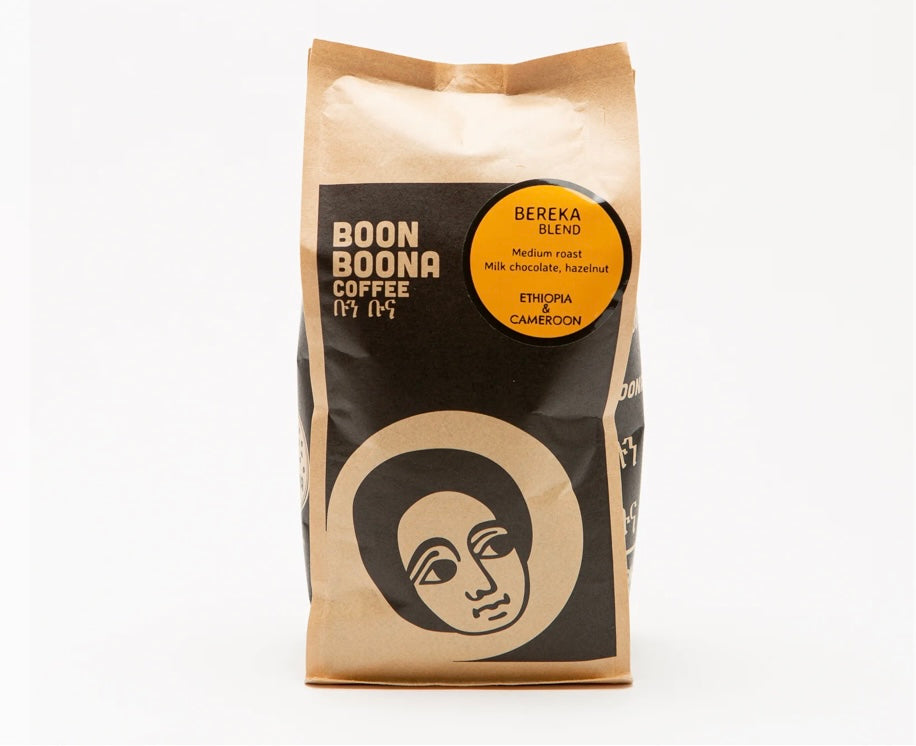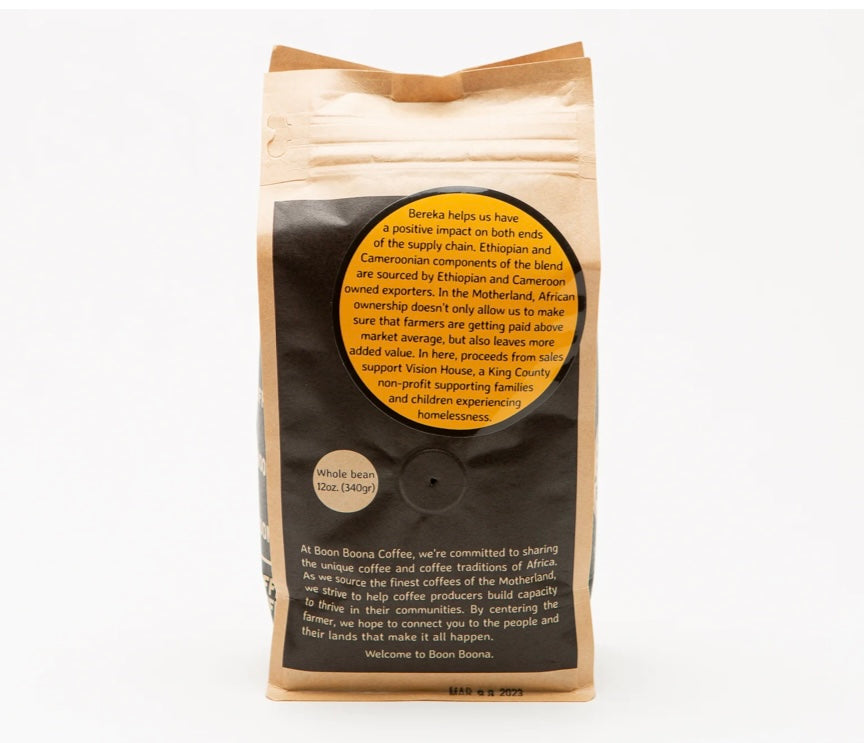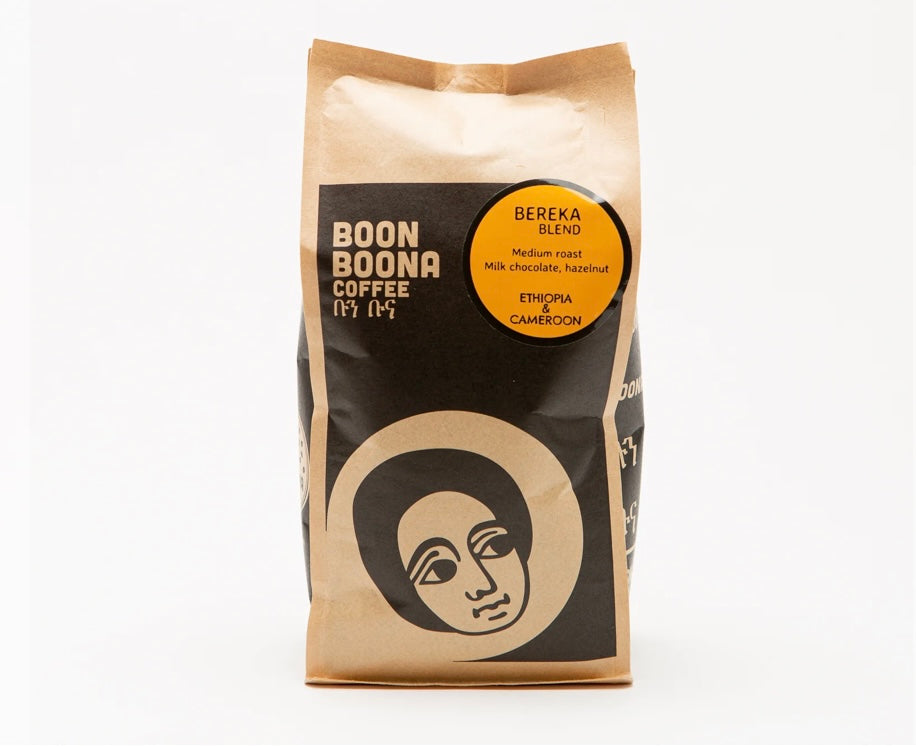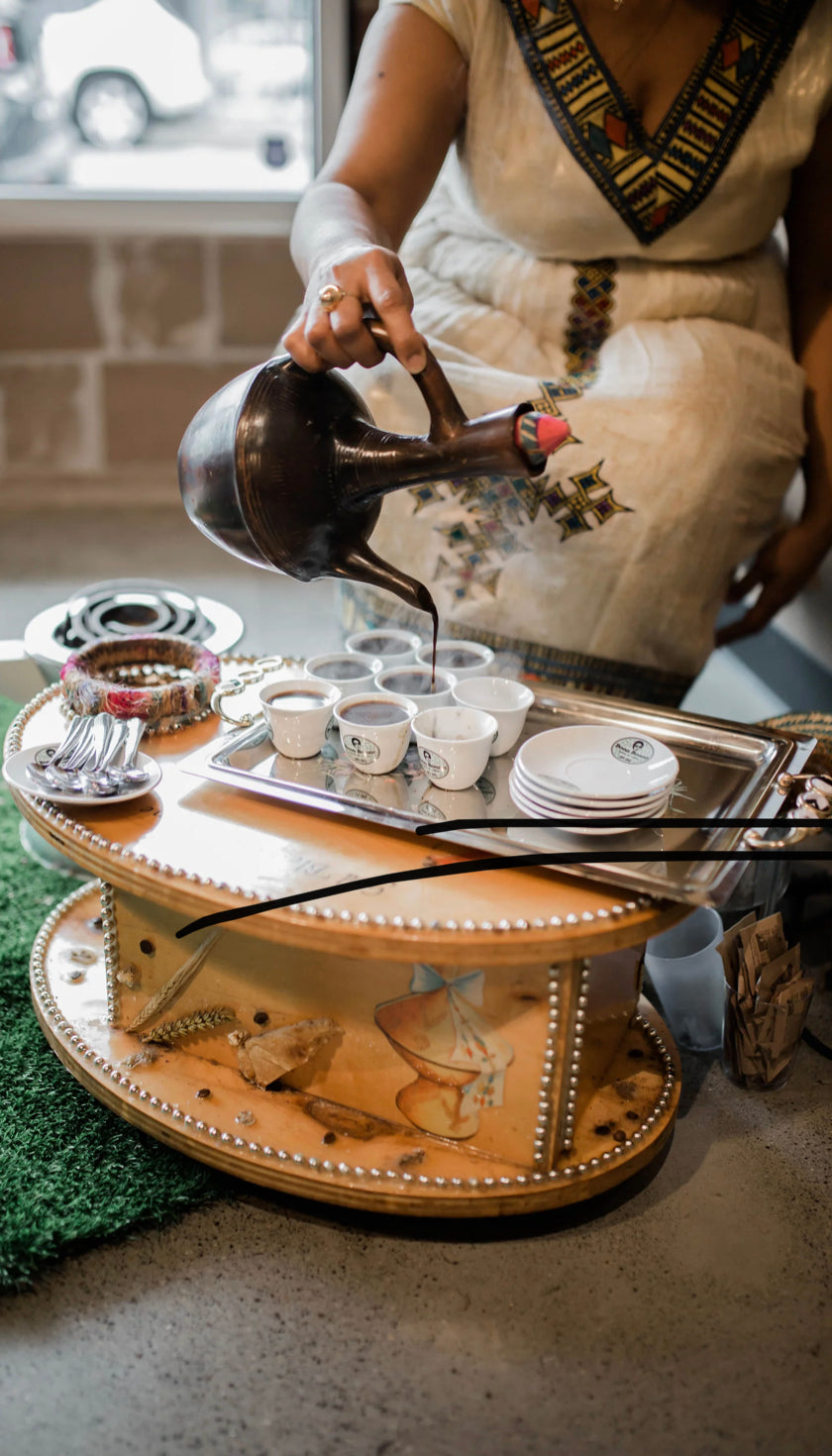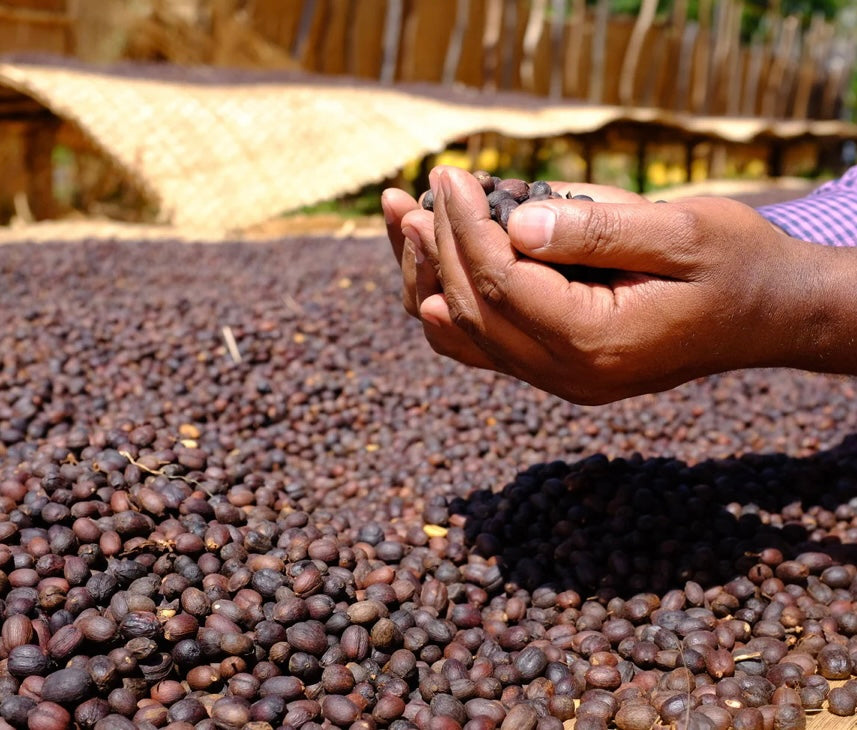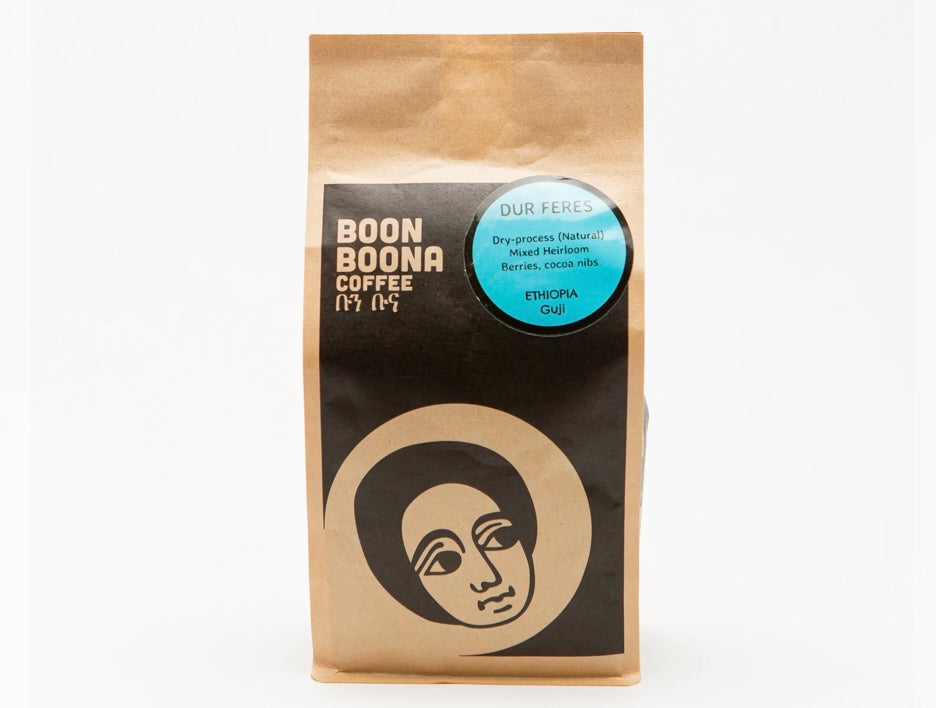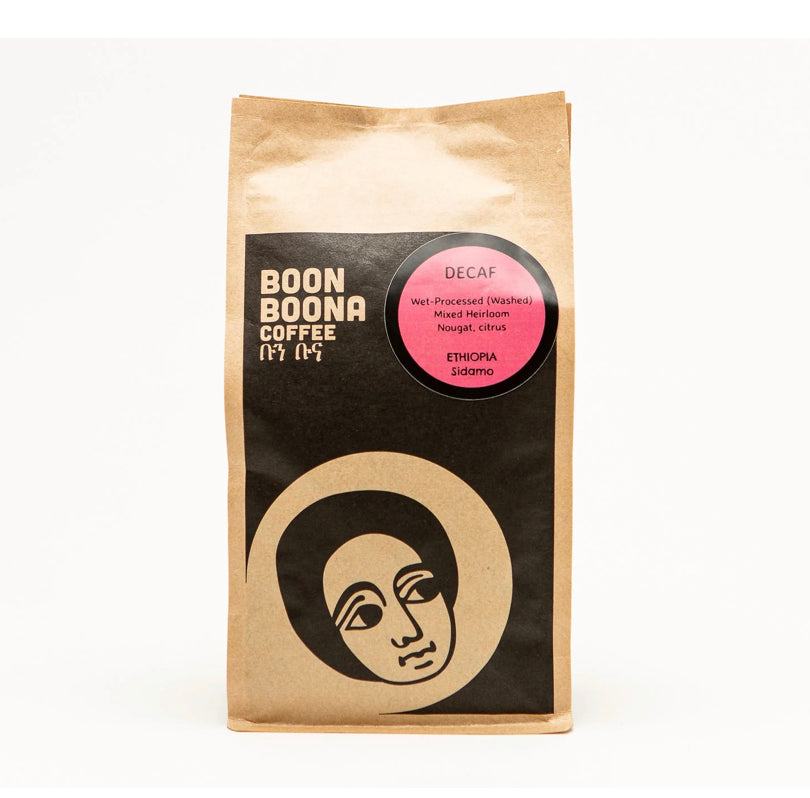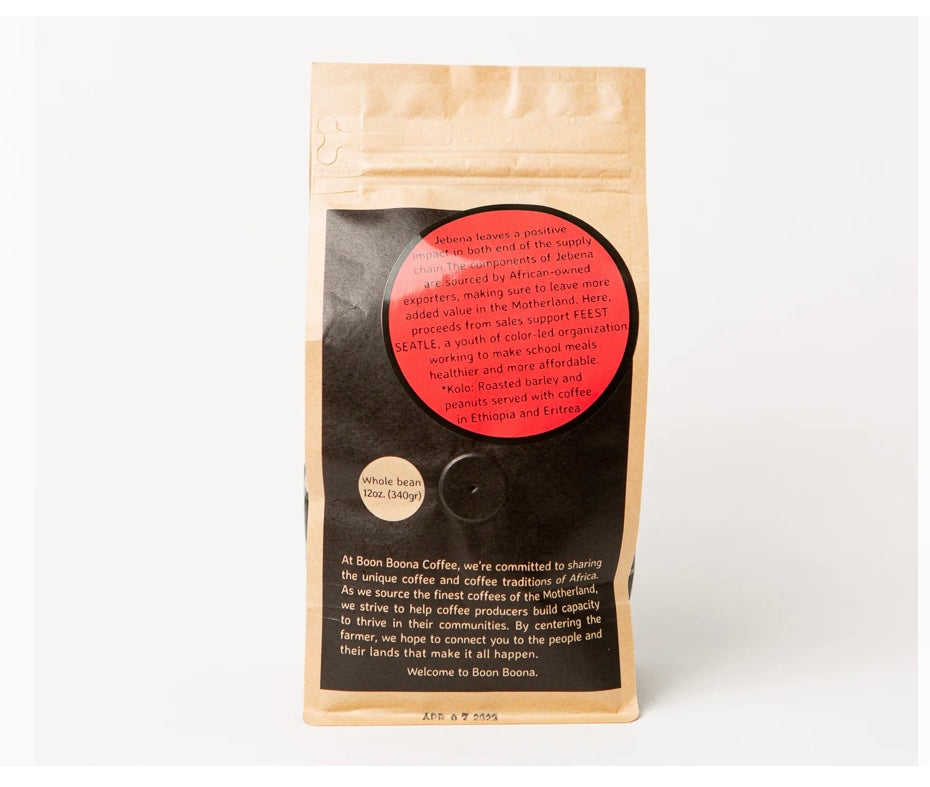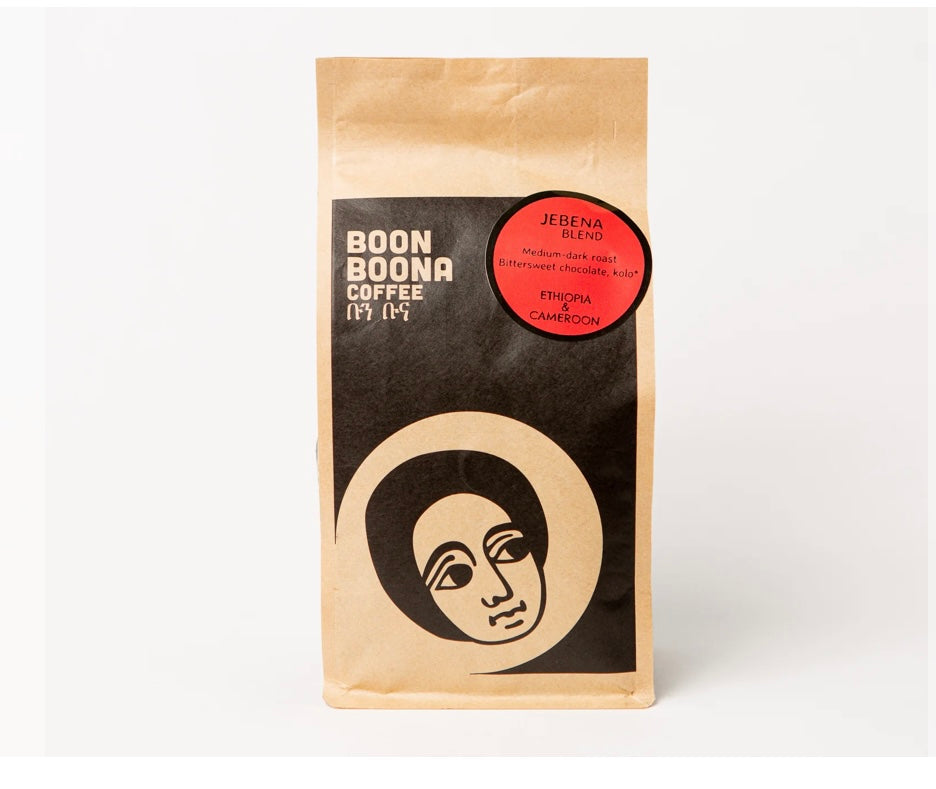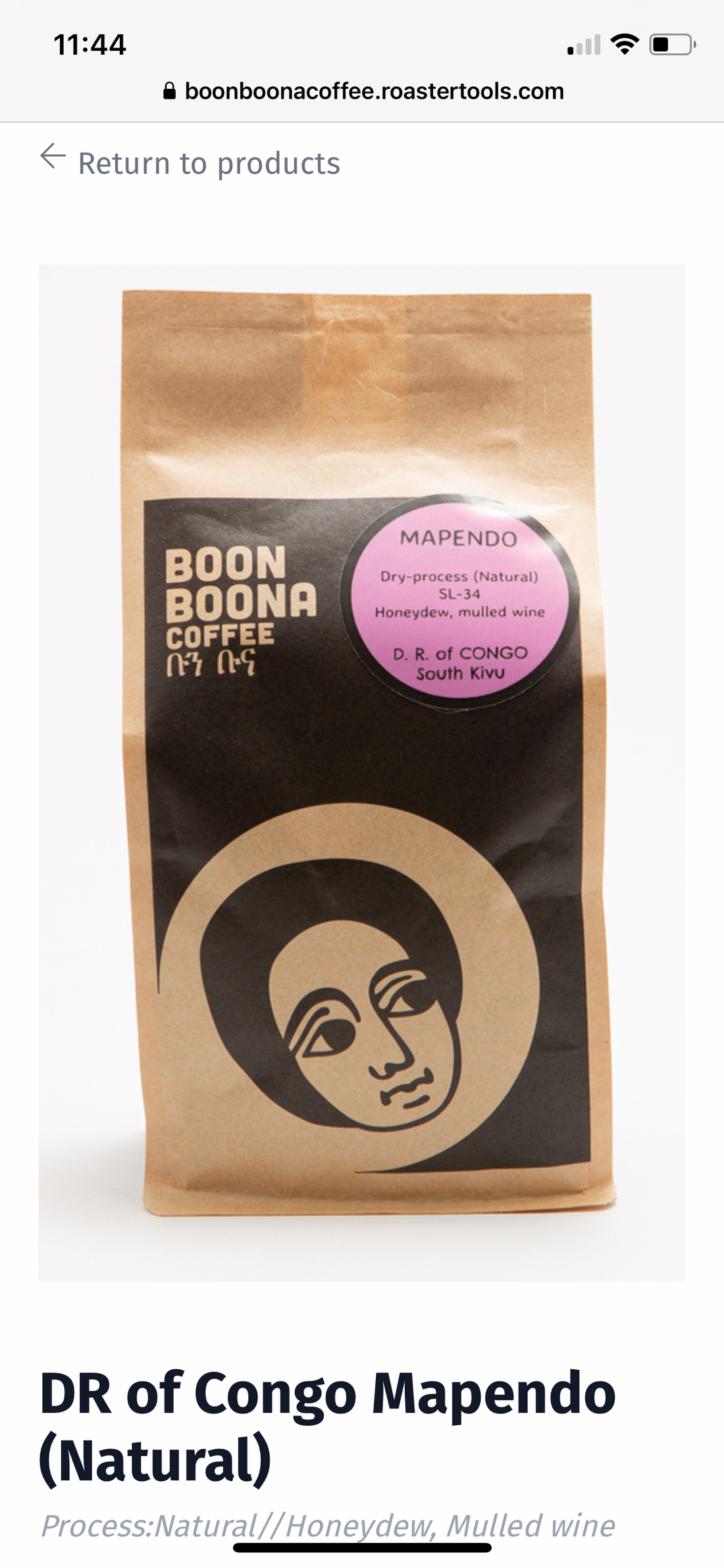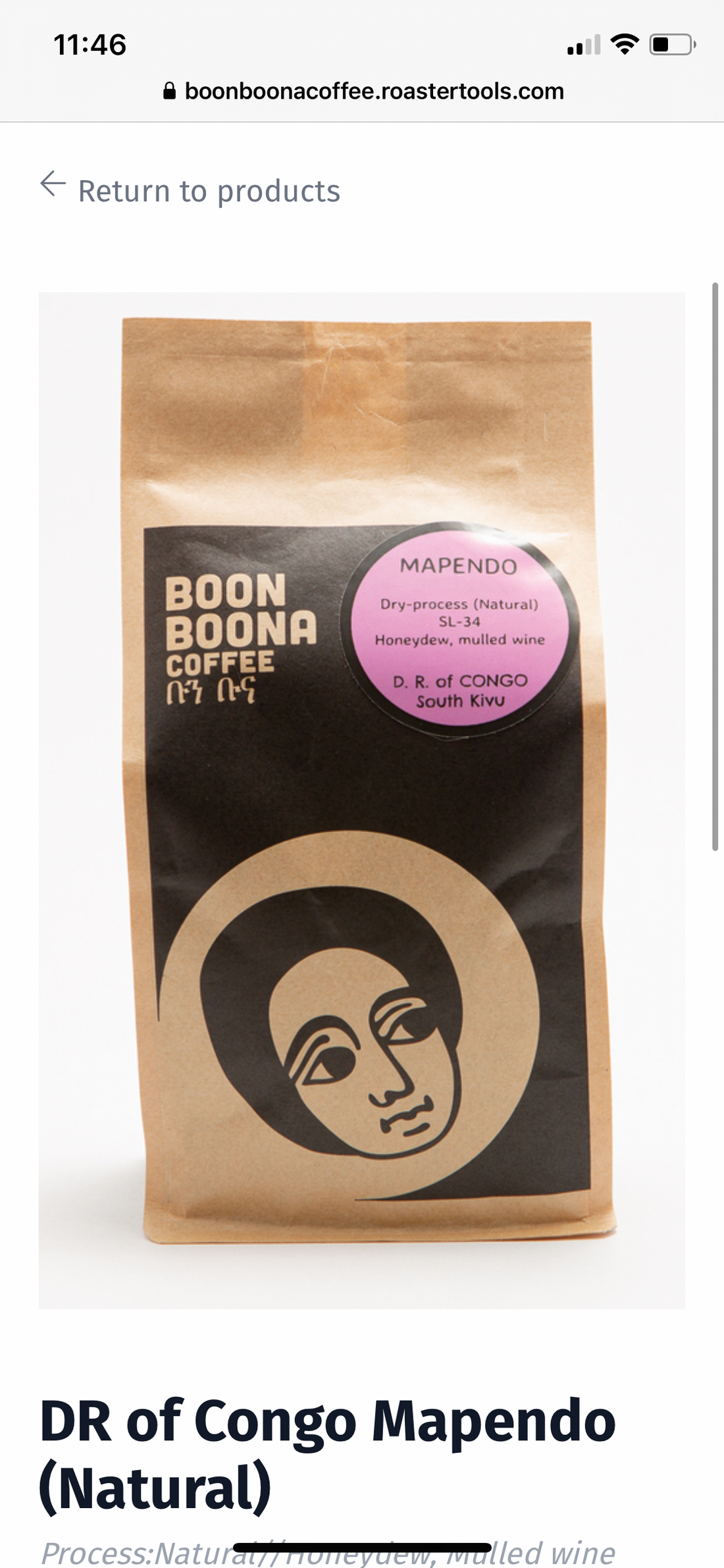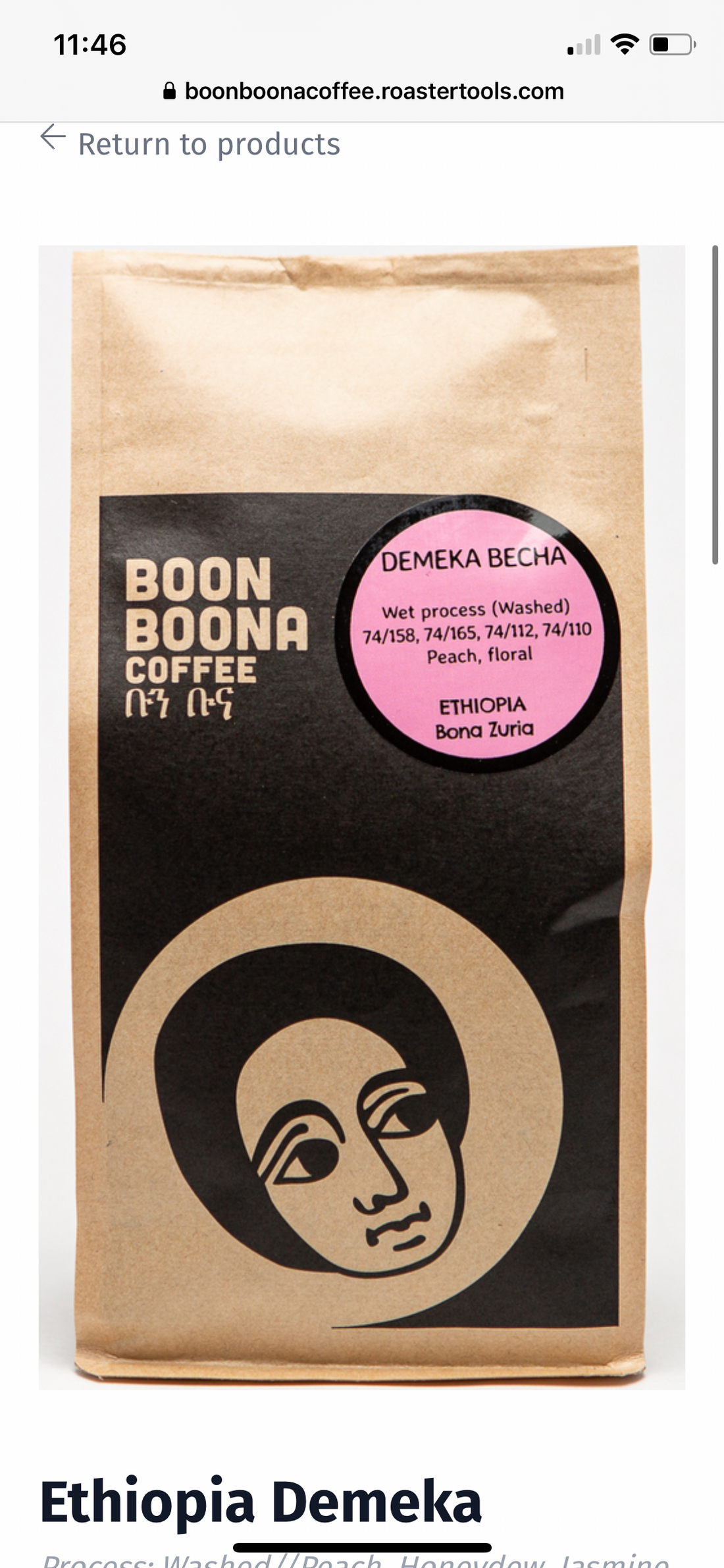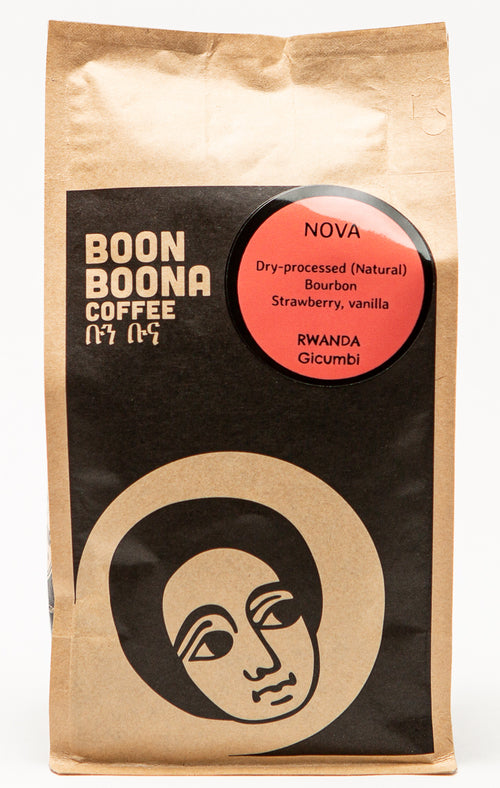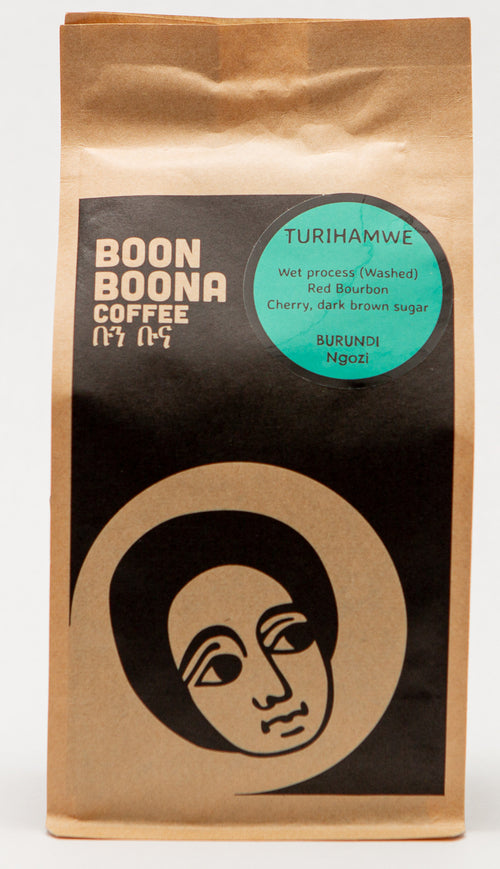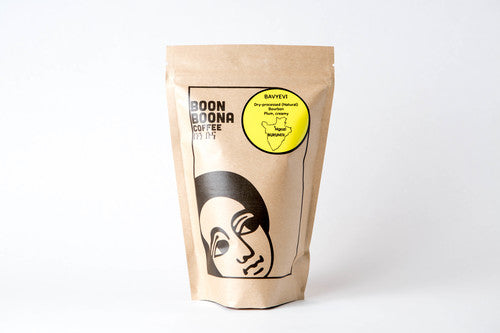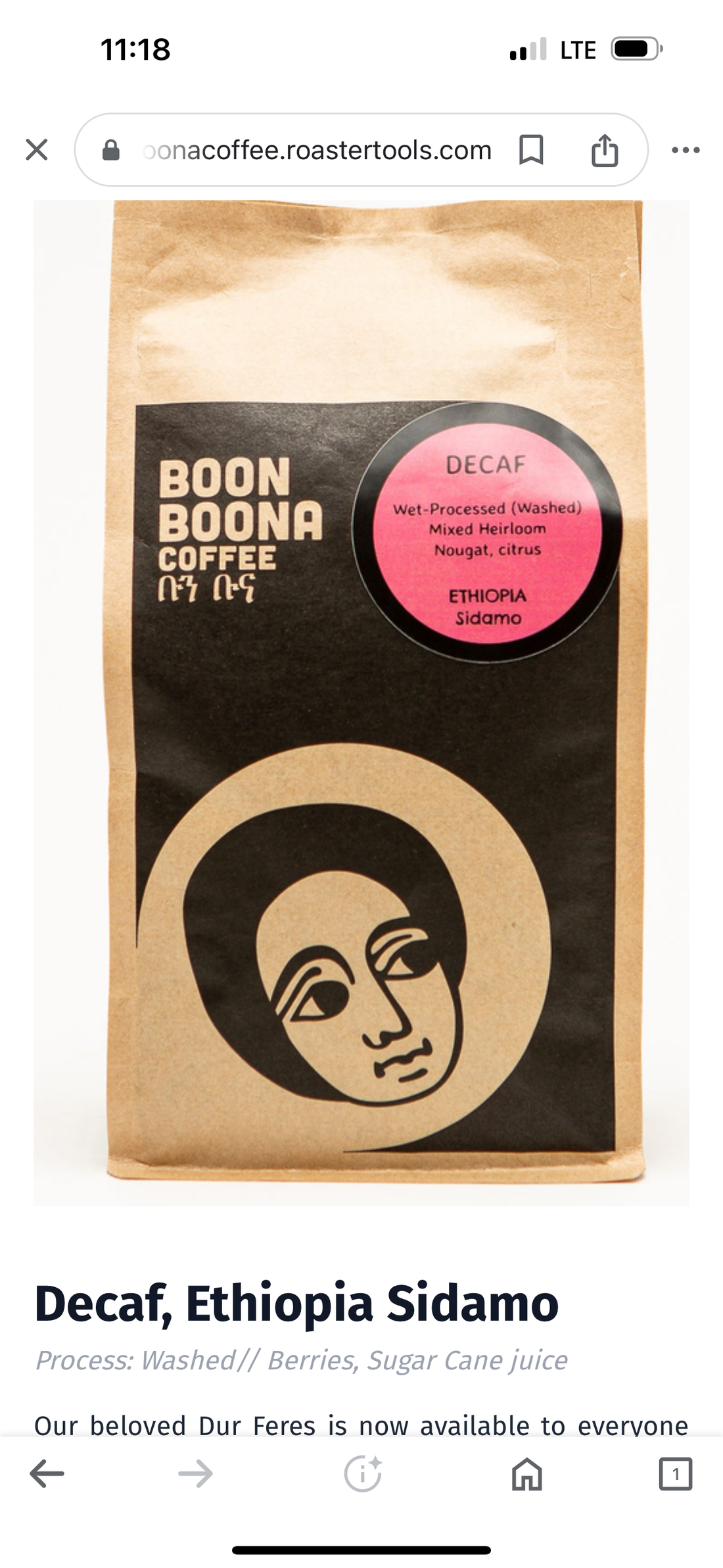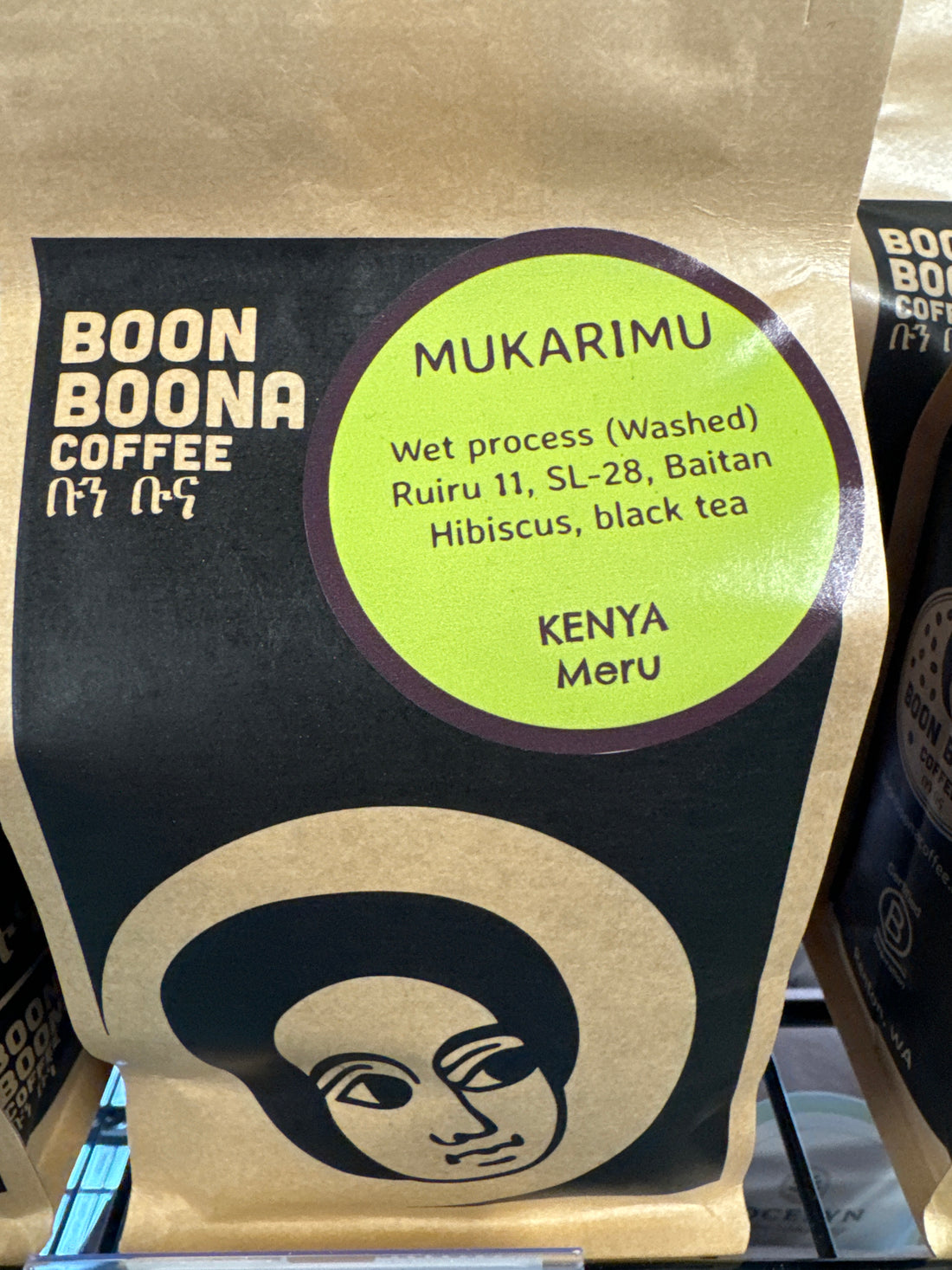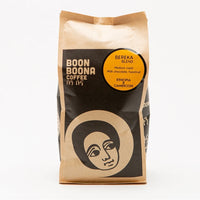
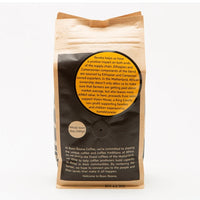
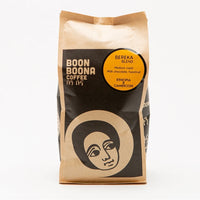
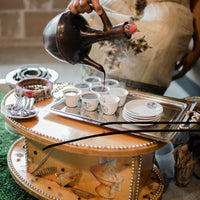
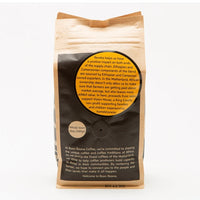
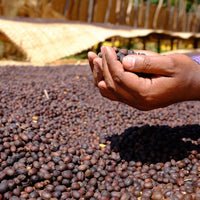
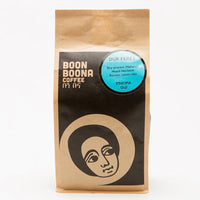

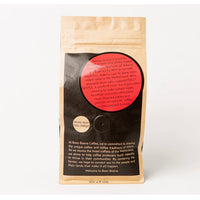

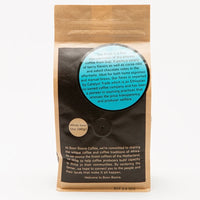
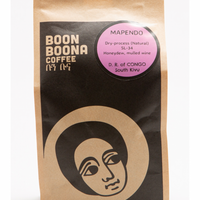
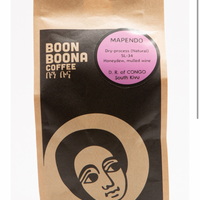
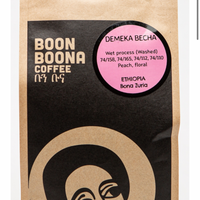
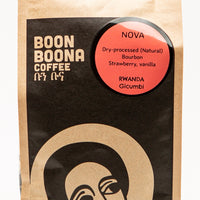
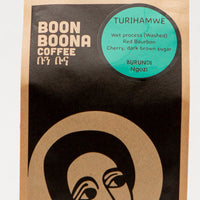
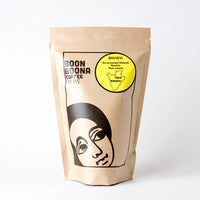
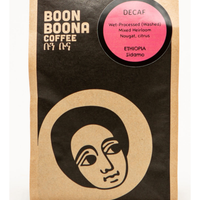
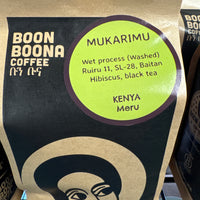
Boon Boona Coffee
BEREKA (Medium Blend)
Bereka is our medium roast blend curated with organic-certified beans from Ethiopia and Cameroon that support sustainable agriculture and healthy food systems. Bereka is an important art of the East African coffee ceremony that is associated with creating strong and warm social ties. We roasted the blend to represent this kind of connection with our community.
Bereka has notes of warm baking spices like cinnamon as well as a welcoming cane sugar sweetness with a creamy body. Bereka makes great espresso and cold brew. It is also at home with manual pour-over methods and immersion methods like french press. Choose your adventure!
What does “Bereka” mean?
Bereka means “to be blessed” in Amharic and represents both the celebration of life centered around the East African coffee ceremony. This ritual is the fabric of all social gatherings, from celebrations to mourning, and we are proud to honor this tradition at Boon Boona.
JEBENA (Medium-Dark Blend)
Jebena is a blend of organic Ethiopian & Cameroon beans supporting sustainable agriculture and healthy food systems. Jebena’s roast profile is developed to honor the traditional coffee ceremony of East African communities. It’s customary to take this roast to higher temperatures with longer roast profiles to have a fuller body and bittersweet flavor notes.
In Jebena , you are going to taste flavors reminiscent of dark chocolate, caramel with a lasting sweetness and a full body. Jebena tastes great with batch brew methods, chemex, french press and also on espresso for those looking for bolder flavors in their espresso.
What does “Jebena” mean?
Jebena is a traditional Ethiopian and Eritrean coffee pot made of pottery most commonly used in the traditional coffee ceremony. The coffee ceremony is the way that many East African peoples enjoy their daily coffee. It is the fabric of all social gatherings, from celebrations to mourning, and we are proud to honor this tradition at Boon Boona.
Dur Feres
We could not be more proud to be the first roaster to offer Dur Feres in greater Seattle area. It is created and sourced by Catalyst Trade who has been specializing in Ethiopian coffee with investors and stakeholders in both Ethiopia and USA. Their transparent coffee trade platform and meticulous sourcing model assure that more of the added value stays in Ethiopia.
Community Lot is one of these value-driven sourcing models. It is a multi-faceted program that helps farmers sell a significantly larger part of their harvest. Ethiopia is full of high-scoring coffees, and it is easy to source top a top-shelf coffee that scores 88+/100. However, these kinds of beans usually has a small share in the whole harvest. Once these top-shelf coffees are sold, the producers end up with hundreds bags of quality coffee. Even if top-scoring coffee has better profitability, the farmers need to sell most of their harvests to be able to make a fair living. Community Lot solves this problem. Catalyst Trade works with producers around the country to curate a specialty-grade blend. These blends are curated using coffees from various regions of Ethiopia as they come ripe. This allows Catalyst Trade to keep a fresh crop supply, helps farmers optimize their sales and income, and gives roasters the consistency that they can build their sourcing programs upon. This is one of the effective ways to source coffee responsibly!
Dur Feres means Wild Horse in Amharic and is Catalyst Trade's flagship community lot. It has the same level of tractability as their top-shelf offerings, is organic certified, and maintains a steady favor profile. Furthermore, the washing stations that provide coffee for this blend are operated by the company's Ethiopian shareholders.
When we sip Dur Feres, we taste blueberries up front and cacao nibs in the finish. It has a round body with medium acidity and a lingering finish. We love this coffee and the people who have make it happen!
Sidamo
We have a new and freshly decaffeinated coffee from Sidamo region: Mullege. SUCAFINA has been building relationships in Ethiopia for over a decade and Lalisaa is their most recent project that is geared towards the community empowerment. Mullege is a dry-processed Sidamo regional blend and it was decaffeinated in July '19 in Swiss Water Process' headquarters in Vancouver, BC. It has citrus freshness and acidity with a nougat finish and full body.
Mapendo
DR of Congo Mapendo (Natural)
Process:Natural// Honeydew, Mulled wine
Mapendo is Swahili for
"love". Linda
Mugaruka, agronomist and Mighty Peace Coffee's (MPC) Chief Quality Officer, ensures that MPC produces loving and award-winning coffee while abiding by the highest environmental & labor standards. One of her curations, Mapendo is Organic & Fair Trade certified, and is farmed by 4,200 farmers, nearly 40% of whom are women. Mapendo makes a sweet and tangy cup with a subtly tannic aftertaste on a pour over methods.
When brewed as espresso, it offers syrupy body coated with jam sweetness and citric acidity.
Demeka Becha
Process: Washed// Peach, Honeydew, Jasmine
Demeka Becha site is situated at the top of a hill in Becha village in Bona Zuria, which is ideal for air flow along the drying beds. The Demeka Becha site is owned and operated by the family of Ayele Tulu, his wife Genet Haile Endeshow, and their son, Tsegab Ayele. They buy cherries from nearby communities including Dilla Suke, Demeka, Goacho, Becha, and Basher-Dale close to 10,000 producers are situated in the areas surrounding the washing station.
Producers bring their cherries to be weighed on the blue scale, logged in the book by Alemu Gobaro (general manager). Once accepted, cherries are floated for density sorting before being dumped into the cement hopper to begin the journey through the 4-disk Agard pulper and into fermentation tanks and cement washing channels. There are 10 tanks for density grades 1 and 2, and 2 tanks for lower density coffee.
Following fermentation and washing, the parchment coffee is carried by hand to the drying beds where laborers spread it out to the depth of a fingertip and keep it turning until it is dried and moved to the locked storehouse to await trucking to Addis Ababa where they are dry milled before export. This year we booked Lot 90/02 from Demeka Becha. The lot carries notes of stone fruit such as peach and apricot as well as honeysuckle. The lively acidity helps highlighting the floral notes which may remind you of bergamot, lavender or grapefruit-peel depending on your mood.
PRODUCER
Producer: Small holder farmers from district of Bona Zuria
Region: Bona Zuria, Sidama Local People Group Name: Sidama
CULTIVATION
Variety: 74/158, 74/165, 74/110, 74/112, and 74 40
Site Elevation: 2155 masl
Farm Elevations. 2100 to 2200 masl
Burundi Bavyevi
Process: Natural // Bourbon, Plum wine, Creamy
We have been working with JNP Coffee to bring you intentionally sourced Burundian coffees since we started roasting at our Renton facility in 2019. When we volunteered with JNP Coffee at 2018 and 2019 Specialty Coffee EXPO, it was easy to witness Jeanine Niyonzima-Aroian's diligence in building relations with producing communities and fairly sourcing women-owned coffee. With a successful career in international business under her belt and a strong motivation to help her people back home, Jeanine founded the nonprofit organization Burundi Friends International in 2008. Farmers began to take notice of the valuable work being done by Jeanine's organization and asked for her help in promoting their coffee. Her collaboration with coffee farmers quickly progressed into the formation of JNP Coffee, which is now known for its award-winning specialty coffees. INP Coffee is the biggest advocate and supporter for the International Women's Coffee Alliance in Burundi fighting for better pay and gender equality. With years of experience in international business, Jeanine also teaches financial literacy and leadership skills to farmers in order to empower and enrich their lives.
Bavyevi is a nod to Jeanine's roots and family in Burundi. It means "parents" in Kirundi and it is grown in the region where Jeanine's family worked in coffee farming. The producer group consists mostly of women farmers and they do an amazing job with harvesting and processing the beans. Bavyevi is a dry-processed (natural) coffee with complex red stone fruit notes (like plum and cherry), chocolate, whiskey notes in the aroma, and mild citrus acidity.
These flavors are carried by a nice and creamy body and clean finish. We recommend brewing it with different methods to better explore its complexity.
Producer
Producer: Bavyevi Cooperative
Region: Ngozi Province
Community: Busiga
Cultivation
Variety: Bourbon
Elevation: 1,800 masl
Harvest: 2022 - 2023
Process
Wet Mill: Bavyevi
Process: Dry Processed (Natural), 100% sun-dried
Roast/Cup
Tasting Notes: Bourbon, Plum wine, Creamy
Burundi Turihamwe
Process: washed //purple/red stone fruits
Flavor notes: Turihamwe has purple/red stone fruits like cherry and plum with a complex dark brown sugar sweetness and lively acidity.
Producer: Turihamwe Turashobora
Region: Ngozi province
Variety: Red Bourbon
Elevation: 1750 masl
Harvest year: Spring 2022
Wetmill: Turihamwe
Process: Wet process
Exporter: JNP Coffee
Importer: JNP Coffee
Turihamwe, which means "together" in Kirundi, is a high-quality coffee produced by women coffee farmers and processed in Burundi's first washing station built and owned by women farmers. Seven women pooled their savings from their JNP Coffee premiums to build their own wet mill in 2019.
Turihamwe is now an International Women Coffee Alliance (IWCA) certified washing station meaning that the coffee is officially women-grown and women-owned.
Now they control the quality of their coffee and this stage of the supply chain. The result is an exceptional coffee that features the sweet and citrus flavors so prized by specialty coffee drinkers. Through their small investment group, Turihamwe Turashobora, these businesswomen plan to use future premium earnings to increase production from five micro-lots to 1,200 bags a year. For these women and nearly 2,000 others, the premiums they earn enable them to save money for the first time in their lives. The women also participate in financial literacy classes that teach them how to make smart decisions with their money. These classes are sponsored by JNP Coffee and Burundi Friends International.
Turihamwe tastes bright like purple/red stone fruits like cherry and plum with a complex dark brown sugar sweetness that carries the medium citrus acidity. Brewing Methods: Batch brew, percolation brewing methods like V60.
Rwanda Nova
Process: Natural // vanilla-like brown spice, dried strawberry notes with zesty citrus acidity
We are welcoming Nova back for the 3rd season! This women-owned and exported coffee is made of fruity, sweet and dry-processed beans. Brew as a pour-over or espresso for the Nova to come alive.
Agnes Mukamushinja founded Nova Washing Station in 2015 with her husband, Managing Director Felix Hitayezu. Together they used their 25 years of coffee experience to establish a washing station that focuses on Rwandan women coffee growers. Nova Coffee now engages with over 28,000 local smallholders. They completed a curriculum and implemented practices that help organizations they work with to be ethically and socially responsible. Nova Coffee is committed to coffee education, gender equality, and the health of their community.
Ikawa House is exporting Nova for us again. An Africa-based, independent coffee exoprter, Ikawa Hose is co-owned by Laetitia Mukandahiro and Uzziel Habimana. Laetitia entered the world of coffee as a cherry picker. She seized a training opportunity offered by the PEARL project that aimed to elevate the coffee quality in Rwanda in early 2000s. Having been introduced to the quality control and coffee sensory analysis, she was hooked! Uzziel grew up on his family's farm on the coast of Lake Kivu and has worked experience in coffee farming and processing before he joined PEARL project.
Having honed their coffee growing and quality assurance skills for over 30 years combined, Laetitia and Uzziel decided to start their own coffee exporter and to do things differently. Ikawa House is eager to create a sustainable coffee community in Rwanda, and support Rwandan youth in accessing to information and training to find meaningful jobs in coffee. They have an education center in Kigali where they teach and train the youth in coffee growing, sensory analysis and trade according to their own curriculum.
They have also established multiple education I hubs that are located closer to the washing stations they work with. Through these hubs they provide on-going training and seminars to improve the livelihoods of smallholder farmers and the younger generation. Ikawa House is determined to increase awareness of the smallholders and the next generation of coffee people about the specialty coffee supply chain to help them elevate their own well-being and economic security.

